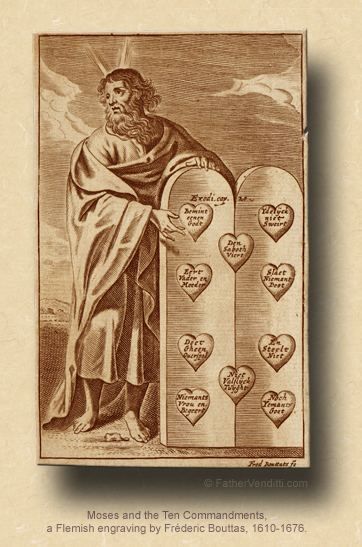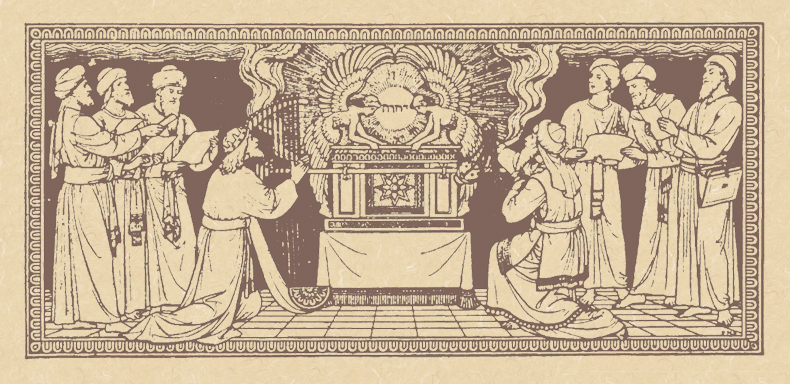To Tell the Truth.
The Tenth Saturday of Ordinary Time; or, the Memorial of the Blessed Virgin Mary on Saturday.
Lessons from the primary feria, according to the ordinary form of the Roman Rite:
• II Corinthians 5: 14-21.
• Psalm 103: 1-4, 9-12.
• Matthew 5: 33-37.
|
When the memorial is observed, lessons from the feria as above, or any lessons from the common of the Blessed Virgin Mary.
|
The Third Class Feast of Saint Gregory Barbarigo, Bishop & Confessor.
Lessons from the common "Státuit…" of Confessors for a Bishop, according to the extraordinary form of the Roman Rite:
• Ecclesiasticus 44: 16-27; 45: 3-20.
• [Gradual] Ecclesiasticus 44: 16, 20.
• Matthew 25: 14-23.
The First Saturday of the Apostles Fast; the Feast of the Holy Martyrs Manuel, Sabel & Ishmael; and, the Feast of Our Venerable Father Hypatius.
First & third lessons from the pentecostarion, second & fourth from the menaion for the Martyrs, according to the Ruthenian recension of the Byzantine Rite:
• Romans 3: 19-26.
• Ephesians 6: 10-17.
• Matthew 7: 1-8.
• Luke 21: 12-19.
FatherVenditti.com
|
 9:16 AM 6/17/2017 — All this week, as we’ve been hearing from Matthew’s Gospel, Our Lord has been refining some of the precepts of the Law of Moses, and using the very formula used often by God when speaking to Moses: “You have heard it said … but I say….” By using that turn of phrase, He’s making a veiled claim to His own divinity, which certainly wasn’t lost on any pharisee who heard Him. It’s consistent with His purpose as stated in our Gospel lesson back on Thursday,—which was the last day I preached to you—wherein He clearly states that He’s come not to abolish the law and the prophets, but to fulfill them. We didn’t dissect each example Our Lord has been giving us because I wasn’t feeling my best and didn’t care to preach along the way. Maybe I should have, especially yesterday when Our Lord told us to pluck out our eye should it cause us to sin. I’m hoping no one here yesterday left church and went out and did that. 9:16 AM 6/17/2017 — All this week, as we’ve been hearing from Matthew’s Gospel, Our Lord has been refining some of the precepts of the Law of Moses, and using the very formula used often by God when speaking to Moses: “You have heard it said … but I say….” By using that turn of phrase, He’s making a veiled claim to His own divinity, which certainly wasn’t lost on any pharisee who heard Him. It’s consistent with His purpose as stated in our Gospel lesson back on Thursday,—which was the last day I preached to you—wherein He clearly states that He’s come not to abolish the law and the prophets, but to fulfill them. We didn’t dissect each example Our Lord has been giving us because I wasn’t feeling my best and didn’t care to preach along the way. Maybe I should have, especially yesterday when Our Lord told us to pluck out our eye should it cause us to sin. I’m hoping no one here yesterday left church and went out and did that.
Believe it or not, I’ve actually seen that. I’m one of the last priests you will ever meet who was in the seminary in the old system, which consisted of three parts: the first part was “Minor Seminary,” which was a high school, so you were starting your seminary training at fifteen. After that, you went to what was called “Philosophy,” or sometimes called “college seminary” because that’s where you got your undergraduate degree. After that, you moved on to “Theology,” which was often referred to as “Major Seminary.” The high school seminaries were all gone by the time I entered, but I did go to college seminary, and got my bachelors degree there, which was always in philosophy, at what was probably the last existing college seminary, in Kentucky, and was in the last class before it closed. I did my Major Seminary in Yonkers, New York, as you know, and was ordained a priest from there. But, by far, the most important part of my formation for the priesthood was in Philosophy, because the college seminary I attended in Kentucky still educated seminarians according to the old scholastic manuals mandated after the Council of Trent, so I was brainwashed by the Summa of Saint Thomas Aquinas, which is why so many of my homilies challenge you to think rather than make you feel good about yourselves.
Anyway, by far, the most formative years I spent in priestly formation were in college seminary, and I’ll never forget my first day. I had arrived mid-term in January of 1980, and having endured an all night train ride from Maryland to Kentucky, I was kind of shell-shocked, standing in the lunch line in a seminary I had arrived at early that morning. Standing in line in front of me was a priest on the faculty, who later became my spiritual director. He was a Holy Ghost Father from Germany, a convert from Judaism, as many members of the Holy Ghost Fathers were, since their founder was also a convert from Judaism. I was the new face in the house, so he turned and looked at me up and down, then leaned over and whispered into my ear, “You know, there used to be requirements for entering the seminary.”
Anyway, college seminary was a unique experience that, unfortunately, no one will ever experience again, since all those institutions are all gone. The daily Mass at Saint Pius X Seminary in Erlanger, Kentucky, was at 11:00, and on this particular day we had just heard last Thursday’s Gospel lesson in which Our Lord says that if your eye causes you to sin, pluck it out. After Mass, I was sitting at lunch, and a young man some years behind me came in late to lunch, sat down at our table, picked up a spoon, and proceeded to gouge out one of his eyes.  Now, you have to understand that his young man clearly had a lot of emotional baggage, but it explains why I may seem somewhat impatient in confession with those of you who come to me with concerns about things you’ve read and things you’ve heard and often caution you about thinking too much about them. There is a great danger in being what I like to call “hyper-spiritual.” Now, you have to understand that his young man clearly had a lot of emotional baggage, but it explains why I may seem somewhat impatient in confession with those of you who come to me with concerns about things you’ve read and things you’ve heard and often caution you about thinking too much about them. There is a great danger in being what I like to call “hyper-spiritual.”
That being said, today Our Lord continues his lesson about how He fulfills the Law of Moses by instructing us about how important it is to keep our word. As usual, Msgr. Knox’s translation is the best: “And thou shalt not swear by thy own head, for thou hast no power to turn a single hair of it white or black. Let your word be Yes for Yes, and No for No; whatever goes beyond this, comes of evil” (Matt. 5: 36-37). And He’s right. In Our Lord’s time, the practice of oath-taking had fallen into disrepute due to the frequency and lack of seriousness with which oaths were taken. Remember that my degree is in philosophy, not theology; and, in philosophy this is known as “casuistry.” It means using technicalities to justify abhorrent or immoral behavior. In Our Lord’s time, casuistry had legitimized non-fulfillment of oaths, and Our Lord clearly took issue with this.
Now, there are certain times when taking an oath is required or us, such as when we are testifying under oath in some criminal of civil manner, and that’s perfectly alright; but, in any ordinary circumstance, a Christian’s word should be sufficient. That’s the point Our Blessed Lord is making today. When there is no pressing legal need to do otherwise, our word as Christians should be sufficient. But, in addition to that, I want very much to caution you about making promises even to Our Lord. Many times, some of you have come into confession saying that you promised Our Lord that you would do this or that, but then failed. May I be so bold as to ask the question: “Who authorized you to make such a promise to Our Lord?” You didn’t ask me about it. You didn’t ask your parish priest about. You just did it, without asking anyone’s permission. You do not have the authority to do that! Pretending that you do is an exercise in the sin of pride, because it betrays the fact that you think you’re someone special.
The reason the virtue of humility is so elusive is because it requires us to take a thoroughly ruthless look at ourselves, and very few of us are capable of that. With that, let me again repeat now, for the fourth time, the line that I want carved on my own headstone: Our one purpose on earth is working out our salvation. Everything else is just window-dressing.

|

